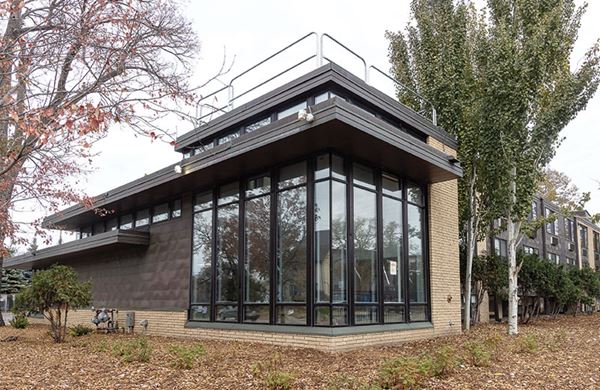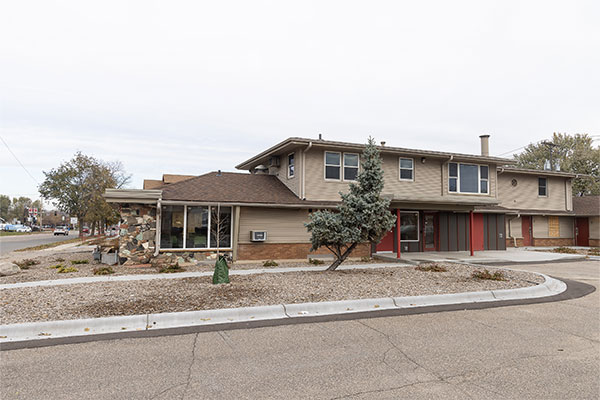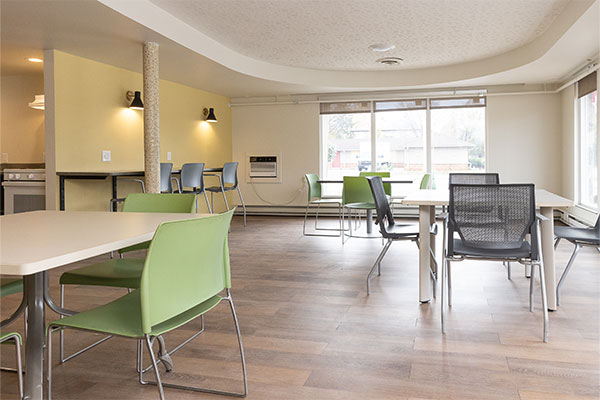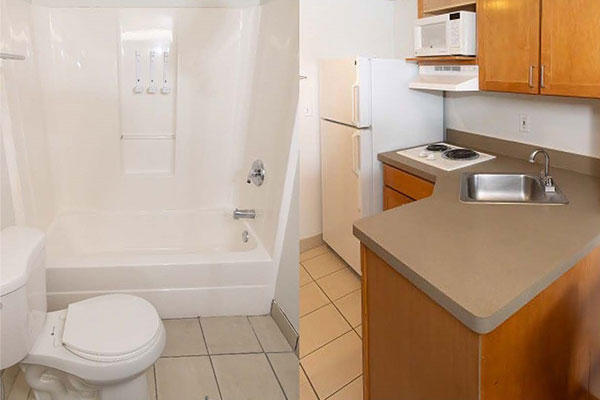Hotels to housing: new tenants are moving in

Dinkytown’s rehabilitated and converted 925 Studios (formerly University Inn) will have 45 units of new deeply affordable housing.
Single Room Occupancy (SRO) housing provides affordable rent to the most vulnerable in our community
While many counties across the country rented hotel rooms for people experiencing homelessness during the pandemic, Hennepin County purchased struggling motels with the long-term goal of converting them to permanent affordable housing, specifically Single Room Occupancy (SRO) housing.
The county purchased five motels and assisted a partner in purchasing a sixth between 2020 and 2022. During spring 2020, with the immediate health and safety of the homeless population in mind, the county transferred 1,137 people who were medically high-risk or older than 60 from congregate shelter to hotels.
Three of the first acquisitions were used as pandemic shelters to replace some of the leased hotel beds, and one launched as permanent housing by end of 2020. Now, the properties are in various stages of rehabilitation and conversion to deeply affordable housing:
- Metro Inn Motel (38 units): Completed conversion and sold to an affordable housing operator in November with long-term affordability requirements and support
- 925 Studios, formerly University Inn (45 units): Completed conversion and sold to an affordable housing operator in November with long-term affordability requirements and support
- Aqua City Motel (units to be determined): Demolished this summer due to poor building condition, in preparation for new development of long-term affordable housing
- Stevens Square Residence (31 units): Leased to an affordable housing operator in 2020, helped 82 people exit homelessness from 2020 through 2023, in preparation for next operator
- Robin Hotel (16+ units): Purchase agreement transferred to an affordable housing operator in 2022 for eventual rental to homeless veterans
- Federal Plaza, formerly LuMinn Hotel (55 units): Used as overflow shelter for homeless families, and has undergone preliminary rehab to permanent rental housing

South Minneapolis’s Metro Inn Motel will have 38 units of new affordable housing.
Leasing up: The Metro and University Inns
Of the six properties under the SRO Strategy, two of them are getting ready for lease up.
The Metro Inn (South Minneapolis) and University Inn (Dinkytown) were originally used as pandemic-related shelter for people experiencing homelessness. The Metro sheltered people at high risk of complications from COVID-19, and University sheltered people who contracted COVID-19. Collectively, they provided 79 pandemic shelter units for 577 nights. Once the University Inn was no longer needed for isolation shelter, it provided 44 overflow family shelter units for 121 nights.
In the summer of 2022, the Hennepin County Housing and Redevelopment Authority (HCHRA) partnered with the county’s Facility Services department to begin rehabilitation and conversion to permanent rental housing for both the Metro and University Inns. The HCHRA finalized sales in fall 2023 to Agate Housing and Services and Property Solutions and Services, respectively, with 30-year forgivable mortgages and deed restriction. The HCHRA is also providing an ongoing operating subsidy to keep rents low.
Together, the former motels will create a total of 83 affordable housing units affordable to people making 30% of the area median income (AMI). Units will rent between $425-$550 per month.
“The conversion and sale of the Metro and University Inns is a really important step to getting more affordable housing available to people,” said Julia Welle Ayres, Housing Development and Finance Director at Hennepin County. “So many people are teetering on the edge of losing their housing, or have lost their housing already, even if they’re working and making a minimum wage. These properties fill a gap in what’s available on the housing market.”
Tenants at the Metro Inn will have private single rooms and bathrooms, and will share a community kitchen and dining space, while tenants at the University Inn will also have kitchenettes included. At least half of the tenants will move in directly from homelessness, reducing capacity burdens in shelters in order to serve people with higher needs.
The Metro Inn and University Inn renovations were completed by small, minority-owned contractors–Iyawe and Associates and Tri Construction—who employed people on probation to complete the projects.

The shared dining and kitchen space at the Metro Inn in South Minneapolis.
What is Single Room Occupancy (SRO) housing?
SRO housing provides basic, dignified, independent housing to people who otherwise don’t have great housing options. SROs have private single rooms, shared or individual bathrooms, and shared kitchens.
Since 2020, Hennepin County has become a national leader in re-introducing SROs into communities—they largely didn’t exist in Hennepin County or elsewhere in the country for decades. This model reduces overall operating costs through county acquisition and conversion and ensures long term affordability through additional financial support and 30-year use restrictions.
Hennepin County invested in this strategy because SROs fill a crucial gap in the housing continuum. SROs are intended for people who:
- Can afford modest rents
- Are newly or periodically homeless
- Do not require on-site supportive services


The interior of one of the units at 925 Studios (formerly the University Inn) in Dinkytown.
Oftentimes, people making the lowest incomes end up in shelters because there are simply not enough affordable rental housing options. This strategy is a cost-effective model to “right-size” housing interventions by acknowledging the specific barriers and strengths of a population.
“I’m really excited by what we’ve been able to do with this strategy,” said Welle Ayres. “What started as a pandemic-era response—which was direly needed in the moment—became an approach to create deep affordability for people that will last. We’re still learning and growing, but we’ve become leaders in this space. We’re testing out an approach that has never been done before! Or at least not for a long time and at this level of quality. And I'm really proud of that.”